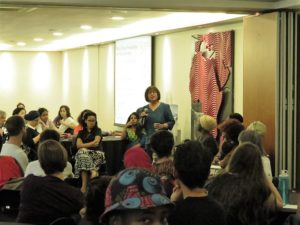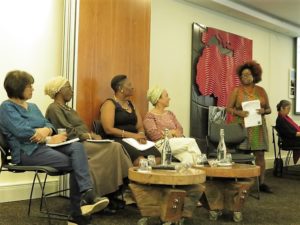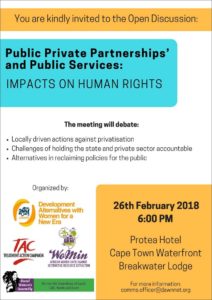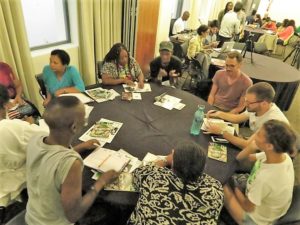Last February DAWN co-organized a panel discussion on PPPs and Public Services and impacts on Human Rights in Cape Town, South Africa
 Public-Private Partnerships (PPPs) are a form of privatization being promoted as efficient and transparent and provide much-needed technology and financing to advance investment not only in infrastructure, but also in areas of special relevance for women ́s lives, such as in the provision of healthcare, education, and more recently, agriculture. However, in practice, PPPs are linked to deepening extractivism and intensifying corporate capture of the state, which in the process, is undermining access and quality of public services increasing inequality.
Public-Private Partnerships (PPPs) are a form of privatization being promoted as efficient and transparent and provide much-needed technology and financing to advance investment not only in infrastructure, but also in areas of special relevance for women ́s lives, such as in the provision of healthcare, education, and more recently, agriculture. However, in practice, PPPs are linked to deepening extractivism and intensifying corporate capture of the state, which in the process, is undermining access and quality of public services increasing inequality.
Concerns for distribution and redistribution of public services to those who were historically denied such basic services have been traded off against efficiency and broadening economic activity through PPPs. In agriculture, it is argued PPPs can advance increase in productivity, growth, rural employment, food security, environmental sustainability and inclusion of small-scale farmers. In practice, they have led to land grabbing and human rights violations, especially of women small-scale farmers.
The rolling back of the state in the provision of public services is an agenda has had disastrous consequences especially for women and the poorest people. Countries in Africa are increasingly advised to sell off state entities responsible for basic public services to increase their revenue earning capacity and to enter PPP arrangements. However, the private sector operates to maximize profit margins.
This was one of the conclusions of the panel discussion co-organized by DAWN on the 26th February 2018 in Cape Town, South Africa, together with three local organizations: The Rural Women Assembly (RWA), Treatment Action Campaign (TAC) and African Women Unite against Destructive Resource Extraction (WomiN). Present, also were other organizations in South Africa which are at the forefront of the struggle against the privatization of public services, such as the Water Crisis Coalition, Housing Assembly, Pathways to Free Education Collective, Reclaim the City, Right to Know and Equal Education.
Hibist Kassa, DAWN Executive Committee member , in her opening remarks compared the current context of global multiple and interlinked  crises with the one when DAWN was born: a moment of crisis of the global capitalist system, in which there is need to make sense of trends and events, and analyze how capitalism and corporations are reacting. It is in this context that PPPs have become a major issue.
crises with the one when DAWN was born: a moment of crisis of the global capitalist system, in which there is need to make sense of trends and events, and analyze how capitalism and corporations are reacting. It is in this context that PPPs have become a major issue.
She emphasized that PPPs are not an entirely new phenomenon, but are becoming a very important tool through which corporations are engaging with states and capturing policy in different sectors. “PPPs are a variation of privatization that offers to supposedly solve problems created by the State; they are assumed to be more efficient and transparent, but in reality there is a lot of evidence that they are just a way for profit-making, especially in the provision of public services, which increases inequality”, she affirmed.
Vivian Taylor, from South Africa, member of DAWN Board, highlighted how the role of the state is being modified and its capacity to deliver public social services is being eroded. She cited as an example the issues of safety and security, one of the areas that affect working-class women more directly. “In the city of Cape Town if you live in the suburbs you can afford to pay private security to protect you against crime; whereas if you live in the townships or in informal settlements, even walking to the toilet becomes a hazardous journey, where women can be attacked, rape, or contaminated with infectious diseases. This lack of infrastructure, electricity, sanitation and waste removal services opens the question: what drives the states to neglect the very basic public services which are essential for people?”
 She continued by stating that the withering away of public services with the increase in private provision has lead the way for growing inequality and is a recipe for disaster: “The evidence is overwhelming that the private sector is not able to operate public services, so why is the State outsourcing the provision of these services to the private sector? This contradictory process is what we are calling into question. We do need to ask: why is there is such a confidence in the capacity of the private sector to deliver on public services? And why is there a lack of confidence in the capacity of the State to do what is its mission?”.
She continued by stating that the withering away of public services with the increase in private provision has lead the way for growing inequality and is a recipe for disaster: “The evidence is overwhelming that the private sector is not able to operate public services, so why is the State outsourcing the provision of these services to the private sector? This contradictory process is what we are calling into question. We do need to ask: why is there is such a confidence in the capacity of the private sector to deliver on public services? And why is there a lack of confidence in the capacity of the State to do what is its mission?”.
Fatou Sow, Professor in Sociology from Senegal, focused in the case of water provision in her country, where scarcity affects more directly women. While water provision had been in the hands of the State since the independence, after 10 years of drought in the 1970s and influenced by the World Bank, it was given to a private French company. She questioned why a private company is needed for distributing the water if the State is still paying for the facilities, the digging, the pipes and the installations.
Sibongile Tshabalala, the chairperson of Treatment Action Campaign (TAC), talked about the health system in South Africa, where currently hundreds of people die daily due to HIV related illnesses. Just like in the case of access to security, only those that can afford to pay have access to adequate treatment. She pointed out the challenges of a poor health system, based on an unequal distribution of resources, where services are increasingly being outsourced to the private sector. “We need to stop these privatizations; we need to do something and say it´s enough”, she concluded.
 Finally, Mercia Andrews, coordinator of the Southern Africa Rural Women’s Assembly (RWA), stressed the impacts of PPPs on people´s daily lives and experiences. She stated that the idea that corporations are more efficient in delivering services is a lie repeated by governments who refuse to deal with the social problems that society faces. She criticized the handling of social welfare to supermarkets in South Africa; as well as the housing policy and the water management, where the government refuses to borrow money to do the required investments.
Finally, Mercia Andrews, coordinator of the Southern Africa Rural Women’s Assembly (RWA), stressed the impacts of PPPs on people´s daily lives and experiences. She stated that the idea that corporations are more efficient in delivering services is a lie repeated by governments who refuse to deal with the social problems that society faces. She criticized the handling of social welfare to supermarkets in South Africa; as well as the housing policy and the water management, where the government refuses to borrow money to do the required investments.
She closed by stating: “There is enough concrete experience for us to not to believe that PPPs are more efficient and better; it is a lie. And I think we need to challenge this. We need to build a society that puts the wellbeing of people at the center. We have accepted to put profit at the center of our society and we haven’t fought back sufficiently”.
The floor was then opened for contributions from the floor. Activists, who were mainly women, shared their experiences and thoughts about the impacts of privatization. The critique presented centered the lived realities of women and communities who have long lived in conditions of crises and who faced the impact of privatization in the provision of housing, electricity, education and in the management of the water crisis in Cape Town. PPPs, therefore, presented an emerging threat that held corporates and the state accountable, while resisting PPPs which threaten to undermine state capacity but also reclaim the state itself.
